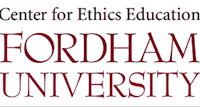On Monday, August 3, several organizations, including the Human Rights Campaign, the National Education Association, and the American Civil Liberties Union released “Schools in Transition: A Guide for Supporting Transgender Students in K-12 Schools.” The report, which addresses issues such as names and pronouns, dress codes, and puberty and medical transition “represents an important milestone in reducing health disparities among transgender youth, something that we are also working toward at the Fordham University Center for Ethics Education,” stated Dr. Celia Fisher, Center Director.
Dr. Fisher and her co-P.I. Dr. Brian Mustanski of Northwestern University, were recently awarded a $1.9 million grant from the National Institute on Minority Health Disparities to examine the ethics of HIV prevention involving LGBT youth. This research has included focus groups specifically designed to determine the needs of lesbian, gay, bisexual, transgender, and gender non-conforming New York City youth.
Recently, Fisher along with Dr. Mimi Arbeit and Melissa Dumont, interviewed transgender and gender non-conforming New York City youth about their health-related experiences.
“Many transgender youth feel that their elementary and high school health classes have let them down by never providing information on transgender issues or the type of health related knowledge important to them,” Dr. Fisher said.
She went on to describe how some youth told them “while they knew early on that they identified as a gender different from what they were assigned at birth, because of the lack of information in health classes or provided by their doctors, they did not have terminology for how they felt or know that there were others who shared their experience.”
Fisher explained that transgender youth can also be very sensitive to how they are portrayed on social media and that for many the term “LGBT” does not necessarily signal inclusion of transgender issues, since the “LGB” portion of this popular term reflects sexual attraction, whereas the “T” reflects a person’s gender identity.
“There are well-intentioned educators, practitioners and members of the media who are often unaware that the language we feel is most helpful may not be what is best for transgender children and teens,” Fisher added.
Fordham University has been a leader in LGBT-inclusive college education, including releasing guidelines for creating an LGBTQ-inclusive curriculum and classroom climate in October 2013. For more information or to read these guidelines, please visit the Center for Ethics Education’s website. ![]()
Written By Fordham University Center for Ethics Education
Fit to a “T”: Addressing the Unique Needs of Transgender Students was originally published @ Ethics and Society and has been syndicated with permission.
Sources:
Our authors want to hear from you! Click to leave a comment
Related Posts






